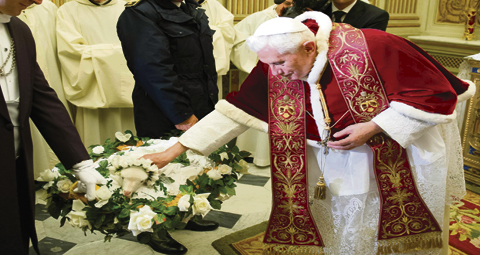January 27 | ![]() 0 COMMENTS
0 COMMENTS ![]() print
print

Pope offers advice to seminarians
— Uses St Agnes, who lived between the 3rd and 4th century, as an example to follow
Pope Benedict XVI has advised the seminarians of his diocese that it takes ‘integrity, maturity, asceticism, constancy and heroism’ to become a great young priest.
As Bishop of Rome, the Holy Father addressed the students and staff of the Almo Collegio Capranica, one of the oldest seminaries of Rome, last Friday in the Vatican’s Clementine Hall. The seminary is celebrating its 555th anniversary this week.
Solid spiritual life
Pope Benedict explained that seminary life must be founded on ‘a solid spiritual life animated by an intense relationship with God, as individuals and in the community, with a particular care for liturgical celebrations and frequent recourse to the sacraments’.
And once ordained, he added, priestly life ‘requires an ever-increasing thirst for sanctity, a clear ‘sensus Ecclesiae’ and an openness to ‘fraternity without exclusion or bias.’
Pope Benedict pointed to St Agnes, a young Roman woman who lived between the 3rd and 4th century who chose to die, rather than surrender her virginity as an example for the seminarians to follow.
“For St Agnes martyrdom meant agreeing to spend her young life, generously and freely, completely and without reserve, so that the Gospel could be announced as the truth and beauty which illuminates existence,” the Pope said. “Her path to the complete gift of self in martyrdom was, in fact, prepared by her informed, free and mature choice of virginity, a testimony of her desire to belong entirely to Christ.”
Developing the mind
Pope Benedict also raised a constant theme of his pontificate with the seminarians by telling them that they need to develop not only their souls but also their minds.
“Part of a priest’s journey of sanctity is his decision to develop, with God’s help, his own intellect, his own commitment: an authentic and solid personal culture which is the fruit of constant and impassioned study,” he proposed.
Being at the heart of the universal Church, the Pope said, should allow them to ‘learn to understand the situations of the various countries and Churches of the world’, to ensure that ‘no culture is a barrier to the word of life, which you must announce even with your lives’.
“The Church expects a lot from young priests in the work of evangelisation and new evangelisation,” the Pope said, before imparting his apostolic blessing. “I encourage you in your daily efforts, that rooted in the beauty of authentic tradition and profoundly united to Christ, you may bring him into your communities with truth and joy.”










